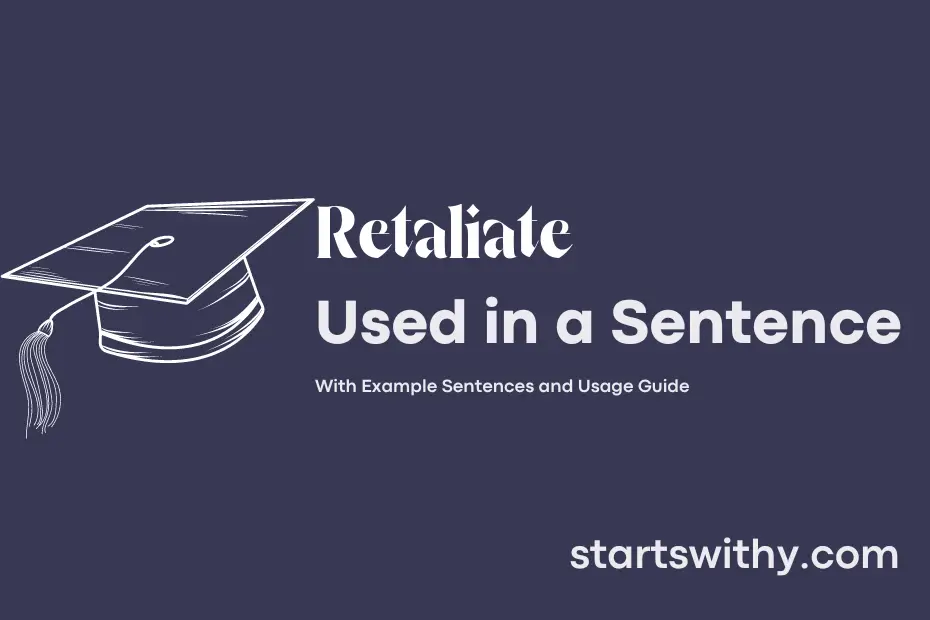Retaliate means to respond in a similar manner, especially when faced with an attack or harm from someone. This word describes the act of seeking revenge or extracting retribution for a perceived wrongdoing or injury.
In various situations, individuals, nations, or even animals may retaliate when they feel threatened, provoked, or mistreated. Retaliation can take many forms, ranging from verbal exchanges to physical confrontations, with the ultimate goal of balancing the scales or asserting one’s power and authority.
7 Examples Of Retaliate Used In a Sentence For Kids
- Retaliate means to get back at someone who has done something wrong.
- It is not nice to retaliate when someone makes you upset.
- We should always think before we retaliate against others.
- It’s important to talk to a teacher if someone tries to retaliate against you.
- We can show kindness instead of choosing to retaliate.
- Let’s remember to be peaceful and not retaliate with violence.
- If someone hurts your feelings, it’s best not to retaliate in return.
14 Sentences with Retaliate Examples
- Retaliate by organizing a peaceful protest if you feel your rights as a student are being violated.
- It’s crucial to not let rumors or gossip affect you, instead retaliate by staying focused on your goals.
- If you receive unfair treatment from a professor, make sure to retaliate by discussing the issue with the appropriate authorities.
- Don’t shy away from speaking up in group projects if you feel your ideas are being dismissed, retaliate by making your voice heard.
- Always be ready to retaliate against discrimination or biased behavior towards you or your peers.
- Remember to retaliate constructively by addressing conflicts with your classmates in a respectful manner.
- If someone tries to bully you or intimidate you, don’t hesitate to retaliate by standing up for yourself.
- In cases of academic dishonesty, it’s important to retaliate by reporting it to the faculty.
- Don’t hesitate to retaliate against unfair grading practices by discussing the issue with your professors.
- When faced with unjust competition, it’s essential to retaliate through hard work and perseverance.
- If a peer tries to sabotage your project or presentation, make sure to retaliate by maintaining your professionalism.
- Always be prepared to retaliate against any form of harassment or bullying on campus.
- It’s important to retaliate against any form of nepotism or favoritism that may be prevalent in the college.
- Remember to retaliate by seeking help from the appropriate channels if you face any form of mental or emotional distress during your college journey.
How To Use Retaliate in Sentences?
Retaliate means to respond to an action with a similar or corresponding action.
To use Retaliate in a sentence, simply follow these steps:
-
Identify the action that you want to respond to. This could be something negative or challenging that someone did to you or someone else.
-
Think about how you want to respond to this action. Decide if you want to use a similar action to show that you won’t accept the behavior, or if you want to find a different way to address the issue.
-
Construct a clear and concise sentence that includes the word Retaliate. For example, “She decided to retaliate by ignoring his messages after he had insulted her.”
-
Make sure the sentence is grammatically correct and effectively conveys your intended meaning.
-
Practice saying the sentence out loud to ensure you are comfortable using the word Retaliate in context.
Remember, using Retaliate in a sentence can help you communicate assertively and set boundaries. Just be mindful of the consequences of your actions and choose your response wisely.
Conclusion
In summary, the concept of “retaliate” involves responding to a harmful or offensive action with a similar, often adversarial, action. The examples of sentences using the keyword “retaliate” illustrate how individuals or groups may seek to retaliate in various contexts, such as in conflicts, disputes, or competitive situations. These sentences highlight the idea that retaliation is a common response to perceived injustice or wrongdoing, and it can perpetuate a cycle of revenge or hostility.
Ultimately, understanding the consequences of retaliatory actions is crucial in finding constructive ways to resolve conflicts and prevent escalation. By considering alternative approaches to retaliation, such as communication, negotiation, or seeking third-party mediation, individuals and communities can work towards peaceful resolutions and break the cycle of retaliation.



